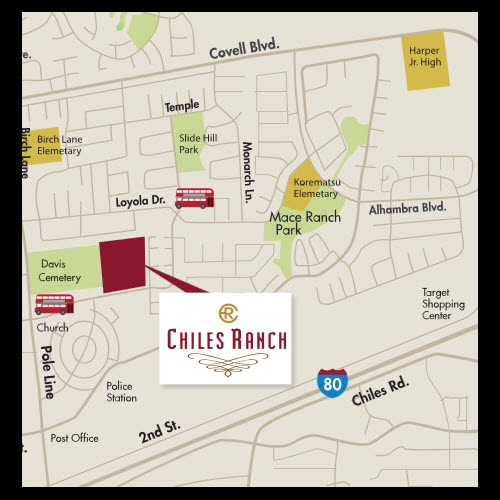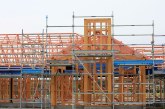 The Davis City Council back in 2009 approved the Chiles Ranch subdivision to develop 108 units on East Eighth Street – after a good amount of community acrimony on the issue. The developer has come back, proposing a number of revisions to the project which will now require city council approval.
The Davis City Council back in 2009 approved the Chiles Ranch subdivision to develop 108 units on East Eighth Street – after a good amount of community acrimony on the issue. The developer has come back, proposing a number of revisions to the project which will now require city council approval.
The proposed modification includes a reduction in the number of dwelling units in the project from 108 down to 96.
The biggest changes appear to involve the affordable housing plan, which would completely eliminate the condominium units from the plan, and revise the overall number of affordable units to 14 which provide “a ‘middle ground’ between what the City ordinance required at the time of the original approval and what the 2013 affordable housing ordinance revision would require today.”
The plan would call for the on-site construction of six for-sale affordable units and a payment of in-lieu fees for the remainder.
The tentative map would subdivide the condominium parcel into nine single-family market rate lots.
They would increase the number of accessory units in the project from a maximum of 10 units, allowed under the existing approval, to 23 units.
Staff writes, “The significant change to the project is a Revised Affordable Housing Plan. The approved plan from 2009 requires 22 for-sale affordable units, provided in 20 condominium units and 2 single-family dwellings. The applicant proposes to omit the condominium units from the project.
“This changes the number of units in the project from 108 to 96. The decrease in number of units in the project changes the affordable housing requirement from 22 to 14. The developer has submitted an Project Individualized Plan (PIP) proposing to meet the obligation through a mix of on-site construction and payment of in-lieu fees. Staff notes that the developer originally proposed to fully meet the revised affordable obligation for 14 units through payment of in-lieu fees. That proposal has been revised under the current Project Individualized Plan (PIP).”
Critics have questioned the desire to remove the condos and have questioned the city policy that allows developers to use in-lieu fees as a means to avoid on-site affordable housing. The in-lieu fees seem to be a way to avoid setting aside actual affordable housing and it would be helpful for the council to assess the impact of in-leu fees versus on-site housing in terms of what ends up with more actual housing on the site.
The Planning Commission was split 3-3 on the issue of the proposed revisions. As staff relays, “The vote reflects support for a mix of on-site construction and in-lieu fees by some commissioners, and a desire to retain the full number of affordable units in the project by other commissions.”
There was support by the commission “for an increased number of accessory units in the project to meet a variety of needs for nannies, students, and others, but not as a means to meet affordability.”
As staff made clear at the time, the accessory dwelling units (ADUs) would not be “affordable” and “were not meant to be considered as such under the project’s affordable housing plan. However, given the size, 400 square feet, the units lend themselves to affordability by virtue of their size compared to larger units that could potentially house more people and command higher rents.”
With respect to the affordability proposal, “there was support and recognition of the City’s need for in-lieu fees to fund other affordable housing activities. On the other hand, dissenting commissioners expressed concern regarding the use of the funds and the proposed revised affordable housing plan in general.”
Dissenting members expressed their difficulty in supporting in-lieu fees “without a specific use of the fees and timeframe identified.” They also expressed support to convert the condos to another type of housing, “but keep the project’s affordability as promised.” There was a preference for “affordable dwellings to be constructed on site” as well as support for the currently approved plan.
Staff notes, “A significant issue was a lack of understanding of how fees paid by the developer would be utilized and concern that the fees would be used for an undetermined project at an undetermined time. There was discussion that without some assurance that the in-lieu fees would be used for an already earmarked affordable housing project at the time the fees are collected, it was difficult to support the developer paying fees in-lieu of providing affordable housing on site.”
Staff also notes, “Should the Council wish to see the project move forward with a greater number of on-site affordable units, direction could be given as a condition of approval to increase the number of on-site units. The proposed affordable units are duets which are already included in the approved 2009 site plan.”
—David M. Greenwald reporting






